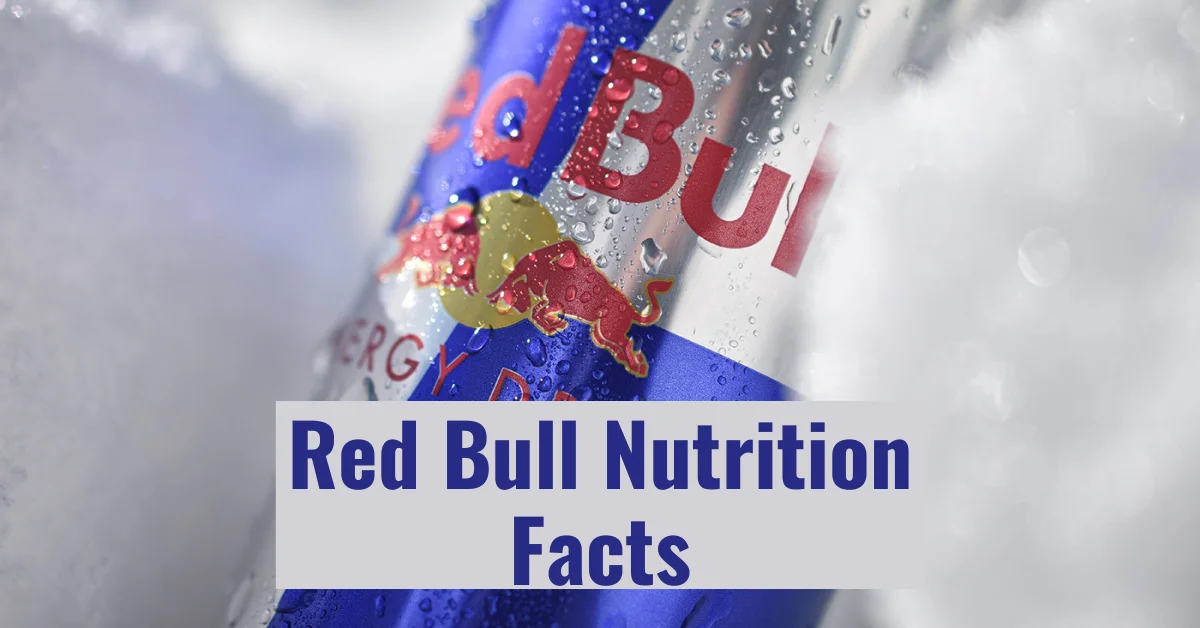FOOD & DRINKS
Red Bull Nutrition Facts: All You Need To Know

Introduction to Red Bull
Red Bull, a popular energy drink worldwide, has gained immense popularity since its inception. Founded in Austria in the 1980s by Dietrich Mateschitz, Red Bull quickly became synonymous with energy and vitality. The brand’s strategic marketing campaigns, coupled with its distinctive flavor and packaging, have solidified its status as a market leader in the energy drink industry. Today, let’s delve into the nutritional aspects of Red Bull and explore the “Red Bull Nutrition Facts.”
Nutritional Composition
When scrutinizing the Red Bull Nutrition Facts and its nutritional composition, it’s vital to grasp the elements that constitute this beverage. A standard 8.4 fluid ounce (250 ml) can of Red Bull contains approximately 110 calories, primarily sourced from its carbohydrate and sugar content. With approximately 27 grams of carbohydrates and 26 grams of sugar per serving, Red Bull delivers a rapid energy boost, owing to its elevated sugar and caffeine levels.
Caffeine stands out as a pivotal ingredient in Red Bull, with an 8.4 fluid ounce can containing about 80 milligrams of caffeine. This caffeine content mirrors that of a standard cup of coffee, rendering Red Bull a favored option for individuals seeking a swift energy surge.
Furthermore, Red Bull is fortified with a spectrum of vitamins and minerals, including niacin (vitamin B3), pantothenic acid (vitamin B5), vitamin B6, and vitamin B12. These supplementary nutrients are incorporated to augment energy metabolism and bolster overall well-being.
Impact on Health
When considering the impact of Red Bull Nutrition Facts on health, it’s crucial to recognize both its benefits and potential drawbacks. While Red Bull can offer a temporary energy boost, excessive intake may lead to adverse health effects. The elevated levels of caffeine and sugar in Red Bull can trigger an increased heart rate, elevated blood pressure, and potential dehydration. Furthermore, frequent consumption of energy drinks like Red Bull has been correlated with sleep disturbances, anxiety, and even cardiovascular issues in certain individuals.
Taurine, an amino acid present in Red Bull and other energy drinks, has garnered attention from health experts due to its potential influence on cardiovascular function. Although taurine occurs naturally in the human body and participates in various physiological processes, its excessive consumption from energy drinks may pose health risks, especially when combined with caffeine.
Comparison with Other Beverages
When comparing Red Bull Nutrition Facts to other beverages, it’s essential to consider its nutritional profile and potential health implications. While Red Bull offers a quick energy boost, it’s important to note that its high sugar and caffeine content may not be suitable for everyone. In comparison to coffee, which contains similar levels of caffeine, Red Bull may provide a more convenient and portable energy solution for some individuals. However, unlike coffee, Red Bull lacks the antioxidants and other beneficial compounds found in coffee beans.
Similarly, when compared to traditional soft drinks, Red Bull stands out for its higher caffeine content and energy-boosting properties. While soft drinks may offer a refreshing taste, they often contain empty calories and lack the nutritional benefits of Red Bull’s added vitamins and minerals.
Regulatory Oversight and Safety
In the United States, the Food and Drug Administration (FDA) regulates the labeling and marketing of energy drinks like Red Bull. Manufacturers are required to adhere to strict guidelines regarding ingredient labeling, caffeine content, and safety warnings. Additionally, the FDA monitors adverse event reports related to energy drink consumption to ensure consumer safety.
Red Bull cans prominently display safety warnings, advising consumers to limit their intake and avoid excessive consumption. These warnings serve as a reminder of the potential health risks associated with energy drinks and encourage responsible consumption practices.
Consumer Tips and Recommendations
To minimize the potential health risks associated with Red Bull consumption, it’s essential to practice moderation and adhere to recommended serving sizes. Individuals sensitive to caffeine or with underlying health conditions should consult with a healthcare professional before consuming energy drinks like Red Bull.
Furthermore, exploring alternative energy-boosting beverages and lifestyle habits can help reduce reliance on Red Bull and other caffeinated beverages. Incorporating nutrient-rich foods, staying hydrated, and prioritizing adequate sleep are essential for maintaining sustained energy levels and overall well-being.
Conclusion
In conclusion, while Red Bull Nutrition Facts offer a convenient energy solution for many individuals, it’s essential to be mindful of its nutritional composition and potential health implications. Moderation is key when consuming energy drinks like Red Bull, and prioritizing a balanced diet and healthy lifestyle habits is crucial for long-term health and vitality.
ALSO READ: DECODING ÇECIIR: AN INTRODUCTORY GUIDE
FAQs
Is Red Bull suitable for children or adolescents?
While Red Bull is marketed towards adults, it’s not recommended for children or adolescents due to its high caffeine and sugar content, which may negatively impact their health and development.
Can Red Bull help improve athletic performance?
While Red Bull may provide a temporary energy boost, its effectiveness in enhancing athletic performance is debatable. Proper hydration, nutrition, and training are more significant factors in optimizing athletic performance.
Are there any health benefits associated with drinking Red Bull?
Red Bull may provide a quick energy boost due to its caffeine and sugar content. However, there are limited long-term health benefits associated with regular consumption, and excessive intake may pose health risks.
How does Red Bull compare to other energy drinks?
Red Bull is one of the most popular energy drinks globally, but its nutritional profile and impact on health may vary compared to other brands. It’s essential to review the ingredients and consult with a healthcare professional to make an informed choice.
What are some alternatives to Red Bull for boosting energy?
Alternatives to Red Bull include natural sources of energy such as black coffee, green tea, and water with lemon. Additionally, incorporating nutrient-rich foods and practicing stress management techniques can help maintain sustained energy levels without relying on energy drinks.
FOOD & DRINKS
Nutrition and Erectile Health: Superfoods for Better Performance

In the quest for overall health and vitality, nutrition plays a pivotal role. While many discussions focus on physical fitness and disease prevention, the impact of nutrition on specific aspects of health, such as erectile health, is often overlooked. By incorporating superfoods into your diet, you can nourish your body and support better performance in various aspects of life, including those moments of intimacy.
Introduction
Nutrition is the foundation of good health, influencing everything from energy levels to immune function. When it comes to erectile health, the foods you eat can have a significant impact on blood flow, hormone balance, and overall cardiovascular health. In this article, we’ll explore some superfoods that can support better performance in various aspects of life, including moments of intimacy.
The Power of Superfoods
Superfoods are nutrient-dense foods that offer a wide range of health benefits. From boosting immunity to supporting heart health, these foods are packed with vitamins, minerals, antioxidants, and phytochemicals that nourish the body and promote overall well-being.
While medications like Cenforce 150 and Fildena 150 can offer temporary relief for performance issues, true vitality comes from within. By prioritizing nutrition and incorporating superfoods into your diet, you can support overall health and well-being, including erectile health. So, next time you’re looking to enhance your performance, consider reaching for a plate of nutrient-packed superfoods. Your body will thank you for it.
Superfoods for Erectile Health
- Dark Leafy Greens: Spinach, kale, and Swiss chard are rich in nitrates, compounds that help improve blood flow by dilating blood vessels. This enhanced circulation can benefit erectile function by promoting healthy blood flow to the genitals.
- Berries: Blueberries, strawberries, and raspberries are loaded with antioxidants, which help protect blood vessels from damage caused by oxidative stress. By reducing inflammation and supporting vascular health, berries can contribute to better erectile function.
- Nuts and Seeds: Almonds, walnuts, and pumpkin seeds are excellent sources of arginine, an amino acid that plays a role in the production of nitric oxide. Nitric oxide helps relax blood vessels, allowing for increased blood flow to the genitals and improved erectile function.
- Fatty Fish: Salmon, mackerel, and trout are rich in omega-3 fatty acids, which have anti-inflammatory properties and support cardiovascular health. By reducing inflammation and improving blood flow, omega-3 fatty acids may help enhance erectile function.
Incorporating Superfoods Into Your Diet
Adding superfoods to your diet doesn’t have to be complicated. Here are some simple ways to incorporate these nutrient-packed foods into your daily meals:
- Smoothies: Blend leafy greens, berries, nuts, and seeds into a delicious smoothie for a nutrient-packed breakfast or snack.
- Salads: Add dark leafy greens, berries, and nuts to your salads for a burst of flavor and nutrition.
- Trail Mix: Create your own trail mix with nuts, seeds, and dried berries for a satisfying and nutritious snack.
- Grilled Fish: Enjoy fatty fish like salmon or trout grilled with a side of leafy greens for a heart-healthy meal.
Conclusion
This article highlights the importance of nutrition in supporting erectile health and suggests incorporating superfoods into the diet as a natural approach to promoting better performance. Additionally, it mentions medications like Cenforce 200 and Fildena as part of a broader discussion on wellness.
FOOD & DRINKS
Cake Decorating Made Easy: Kits That Cover All the Basics

Cake decorating is an art that showcases the creativity of a person and transforms an ordinary dessert into a very special one. For people who are just beginners in the field of cake decorating, this journey may seem difficult at first, but once a person gets into it, it will not be that difficult. The perception needed tor the perfect icing or frosting on the cake or to make beautiful flowers or other patterns is very important while decorating the cake.
This problem of complex icing swirls has now been solved by the innovation of cake decorating kits that have made it easy to access perfect and stunning cakes that can be enjoyed at every skill level. These easy-to-use cake decorating kits provide all the important tools that will help you transform your cake decorating journey. This blog will explore the essentials of cake decorating kits, helping you choose the right kit and utilize it effectively to create stunning cakes.
Benefits of Cake Decorating Kits
Cake decorating kits have become increasingly popular due to their convenience and the simplicity they bring to the decorating process. These kits are carefully curated to include a variety of essential tools and supplies, catering to both novices and seasoned bakers who wish to streamline their decorating tasks. By purchasing a kit, you can bypass the hassle of collecting individual items and start decorating immediately with a comprehensive set of tools.
Choosing the Right Cake Decorating Kit
When selecting a cake decorating kit, consider the following to ensure it meets your baking and decorating needs:
Versatility: Opt for kits that offer a range of tools for different decorating techniques, allowing you to explore various designs.
Quality: Choose kits with high-quality components, such as stainless steel tips and silicone piping bags, which are durable and easy to clean.
Comprehensiveness: Ensure the kit includes all the basic necessities like piping bags, tips, and spatulas to cover different types of projects.
Skill Level Compatibility: Select a kit that matches your skill level. Kits designed for beginners usually feature simpler, easy-to-use tools, whereas more advanced kits offer specialized tools for intricate designs.
Factors to keep in mind while choosing cake decorating kit
When choosing a cake decorating kit, it’s crucial to consider several key factors to ensure it meets your specific needs:
Versatility: A good kit offers tools that adapt to various decorating tasks, from simple frosting techniques to complex fondant detailing.
Quality: High-quality materials in your tools, such as stainless steel tips and silicone piping bags, not only provide durability but also ensure ease of use and cleaning.
Comprehensiveness: The kit should cover all the fundamental tools—piping bags, various tips, spatulas, and more—necessary for a broad array of projects.
Skill Level Adaptation: Match the kit to your experience level; beginners should look for kits with straightforward, easy-to-use tools, while advanced decorators might prefer kits with specialized items for intricate work.
Essential Tools Included in Cake Decorating Kits
A well-equipped cake decorating kit should contain the following items to facilitate a variety of decorating techniques:
Piping Bags and Tips: Essential for creating textured designs and intricate details on cakes.
Couplers: These fittings allow you to change piping tips on the same bag, enhancing versatility without the need for multiple bags.
Spatulas: Offset spatulas are crucial for evenly spreading icing, while a palette knife can handle more detailed work.
Turntable: Helps in evenly applying icing and placing decorations around the cake.
Smoothers: Ideal for achieving a flawless finish on fondant-covered cakes.
Fondant Tools: These are necessary for rolling and cutting fondant into decorative shapes.
Decorating Brushes: These are useful for painting detailed designs or applying small amounts of edible glue.
Tips for Effective Use of Your Cake Decorating Tools
To truly benefit from your cake decorating kit, consider the following tips:
Practice Regularly: Use parchment paper or a silicone mat to hone your piping skills before attempting to decorate an actual cake.
Maintain Cleanliness: Keep your tools clean to ensure smooth operation and to avoid flavor contamination.
Learn New Techniques: Explore online tutorials or enroll in cake decorating classes to expand your skills.
Be Creative: Experiment with different designs and techniques. The flexibility of a decorating kit allows you to express your creativity freely.
Conclusion
Cake decorating kits simplify the process of learning and mastering cake decoration, making it accessible to everyone from beginners to professional bakers. With the right kit, patience, and practice, you can easily start creating beautiful, professional-looking cakes. Remember, the journey in cake decorating is not just about perfecting your skills but also about enjoying the creative process and having fun along the way. So, grab your RFAQK cake decorating kit and let your baking adventure begin.
FOOD & DRINKS
Mushrooms for Mental Health and How They Can Support Brain Function

In recent years, there has been growing interest in the potential of functional mushrooms to support mental health and cognitive function. Traditionally used in various cultures for their medicinal properties, mushrooms are now gaining recognition for their ability to enhance brain health and improve mood. In this post, we’ll explore the cognitive and mood-enhancing benefits of functional mushrooms, discuss research-backed evidence on specific mushroom species, and provide practical tips for incorporating them into daily routines.
- Functional mushrooms have been used for centuries in traditional medicine systems such as Traditional Chinese Medicine (TCM) and Ayurveda for their medicinal properties.
- Mushrooms contain bioactive compounds that may support mental health and cognitive function, such as polysaccharides, beta-glucans, and triterpenoids.
- The growing interest in functional mushrooms is driven by an increasing body of scientific research supporting their health benefits.
- Mushrooms are considered adaptogens, meaning they help the body adapt to stress and maintain balance, which can positively impact mental well-being.
- Different mushroom species have unique properties and may offer specific benefits for brain health and mood regulation.
Cognitive and Mood-Enhancing Benefits of Functional Mushrooms
Functional mushrooms have long been revered for their ability to support overall health, but their impact on brain function is particularly noteworthy. These mushrooms contain bioactive compounds that can cross the blood-brain barrier and interact with neurotransmitter systems, leading to improved cognitive function and mood regulation.
Mushrooms such as Lion’s Mane, Reishi, and Cordyceps are especially renowned for their cognitive and mood-enhancing benefits. Lion’s Mane, known for its distinctive appearance resembling a lion’s mane, contains compounds called hericenones and erinacines, which have been shown to stimulate nerve growth factor (NGF) production in the brain. This promotes the growth and repair of nerve cells, potentially improving memory, concentration, and overall brain function.
Reishi, often referred to as the “king of mushrooms,” contains bioactive compounds like triterpenes and polysaccharides that have been linked to reduced stress and anxiety levels. Research suggests that Reishi may exert its mood-enhancing effects by modulating the activity of neurotransmitters such as serotonin and dopamine, which play key roles in regulating mood and emotional well-being.
Cordyceps, another prized mushroom in traditional medicine, is known for its adaptogenic properties, helping the body adapt to stress and maintain balance. Studies have shown that Cordyceps may improve cognitive function by increasing oxygen utilization in the brain and enhancing mitochondrial function, leading to greater mental clarity and focus.
Morel mushrooms, a hidden gem of the fungal world, revered for their distinct flavor and meaty texture, are also gaining recognition for their potential health benefits. Rich in antioxidants and nutrients like vitamin D and copper, morel mushrooms have been linked to immune support and may aid in reducing inflammation. Moreover, recent research suggests that certain compounds found in morel mushrooms could have neuroprotective properties, potentially benefiting cognitive function. However, these delicate fungi have a short shelf life. If you’re lucky enough to find some fresh morels, learn how to store morel mushrooms to preserve their flavor and texture best.
Research-Backed Evidence on Mushroom Species for Brain Health
Numerous studies support the cognitive and mood-enhancing benefits of functional mushrooms. For example, a study published in 2017 found that Lion’s Mane supplementation improved cognitive function in older adults with mild cognitive impairment. Participants who consumed Lion’s Mane extract for four months showed significant improvements in cognitive function compared to those who took a placebo.
Research suggests that Reishi mushrooms may have potential benefits for reducing symptoms of anxiety and depression. Studies have shown that Reishi extract supplementation reduced anxiety and depression levels in mice subjected to chronic stress. However, the therapeutic potential of Reishi mushrooms for mood disorders in humans is still under investigation.
Practical Tips for Incorporating Mushrooms into Daily Routines:
Incorporating functional mushrooms into daily routines can be easy and enjoyable. Here are some practical tips to help you reap the cognitive and mood-enhancing benefits of mushrooms:
- Add them to your meals: Incorporate mushrooms like Lion’s Mane, Reishi, or Cordyceps into your cooking. You can sauté them with vegetables, add them to soups or stews, or blend them into smoothies for an extra nutritional boost.
- Try mushroom supplements: If you prefer a more convenient option, consider taking mushroom supplements. Look for high-quality supplements made from organic mushrooms and follow the recommended dosage instructions.
- Experiment with recipes: Get creative in the kitchen and experiment with recipes featuring functional mushrooms. Try making a Lion’s Mane stir-fry, a Reishi mushroom tea, or a Cordyceps-infused smoothie. The possibilities are endless!
- Stay informed: Keep up to date with the latest research and information on functional mushrooms and their benefits. Websites like [URL] offer valuable resources and recipes to support your journey to better brain health.
Functional mushrooms offer a natural and effective way to support brain health and improve mood. With their cognitive and mood-enhancing benefits backed by research, mushrooms like Lion’s Mane, Reishi, and Cordyceps are valuable additions to any wellness routine. By incorporating these mushrooms into your daily diet and lifestyle, you can optimize brain function, reduce stress, and enhance overall mental well-being. Start exploring the world of functional mushrooms today and unlock their potential for better brain health and vitality.
- Functional mushrooms are rich in antioxidants, which help protect brain cells from oxidative stress and damage.
- Some mushrooms, like Lion’s Mane, contain compounds that stimulate the production of nerve growth factor (NGF), promoting the growth and repair of brain cells.
- Reishi mushrooms have been shown to modulate the activity of neurotransmitters such as serotonin and dopamine, which play key roles in mood regulation.
- Cordyceps mushrooms may improve cognitive function by increasing oxygen utilization in the brain and enhancing mitochondrial function, leading to greater mental clarity and focus.
- Incorporating functional mushrooms into your diet may also support overall health and immunity, as they contain vitamins, minerals, and other beneficial nutrients.

 BUSINESS1 year ago
BUSINESS1 year agoExploring the Benefits of Commercial Printing

 HOME IMPROVEMENT12 months ago
HOME IMPROVEMENT12 months agoThe Do’s and Don’ts of Renting Rubbish Bins for Your Next Renovation

 BUSINESS12 months ago
BUSINESS12 months agoBrand Visibility with Imprint Now and Custom Poly Mailers

 HEALTH8 months ago
HEALTH8 months agoThe Surprising Benefits of Weight Loss Peptides You Need to Know

 TECHNOLOGY10 months ago
TECHNOLOGY10 months agoDizipal 608: The Tech Revolution Redefined

 HEALTH8 months ago
HEALTH8 months agoYour Guide to Shedding Pounds in the Digital Age

 HOME IMPROVEMENT8 months ago
HOME IMPROVEMENT8 months agoGet Your Grout to Gleam With These Easy-To-Follow Tips

 HEALTH11 months ago
HEALTH11 months agoHappy Hippo Kratom Reviews: Read Before You Buy!










